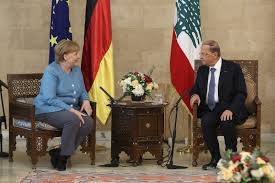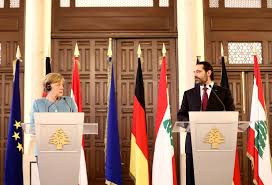Lebanon and Germany united in aim to resolve refugee crisis “If the solution is delayed … who could then guarantee the return of the displaced to their country?” President of Lebanon General Michel Aoun (Edited by M. E. Times Int'l) German Chancellor Angela Merkel has met with Lebanon’s leaders. During her three-day visit to Beirut, Ms Merkel spoke with President Michel Aoun, Prime Minister-designate Saad Hariri and Speaker of the House Nabih Berri and also took part in an economic roundtable. Lebanon’s burden of dealing with Syrian refugees was a keynote of their talks along with the desire to boost economic ties between the two countries PRESIDENTof the Republic of Lebanon, General Michel Aoun, asked German Chancellor Angela Merkel for "Germany's help in supporting Lebanon's position that the Syrian refugees should return to safe areas in Syria”. He made the request in a meeting with German Chancellor Angela Merkel during a three-day visit by the German leader and delegation to Lebanon He also stressed the need to separate the Syrians’ return from a political solution to the crisis. "If the solution is delayed and the balance of power is altered, who could then guarantee the return of the displaced to their country?" Aoun asked, "the unresolved Cyprus crisis (...) and the Palestinian cause which, 70 years later, still awaits a political solution." President Aoun said that "Lebanon has borne so much on various levels, as a result of the Syrian displacement. The number of displaced is almost 1,800,000; this is beyond our ability to bear," noting that "international aid is not enough compared to the losses suffered by Lebanon” "However, we continue to provide support at a time of towering unemployment, especially among the younger generation." Referring to Lebanese-German relations, Aoun stressed "the need to develop ties in all fields, especially since Germany is the fifth economic partner for Lebanon." He uttered appreciation for Germany's support to the Lebanese armed forces, praising "the German contribution within the UNIFIL's naval force." The President did not fail to thank "Germany's positive attitude and its contribution to the success of the Rome II conferences aimed to support the armed forces, and the CEDRE Conference devoted for supporting the Lebanese economy." He praised ongoing co-operation between Lebanese and German businessmen, highlighting their economic meeting which would “provide suitable opportunities for bolstering economic relations between the countries and facilitating the entry of Lebanese products into European markets". He also encouraged the establishment of a joint Lebanese-German chamber of commerce and the signing of co-operation agreements between the countries. MERKEL  For her part, Merkel stressed her country's desire to "continue to assist Lebanon in various fields and help it face the difficulties and challenges that lie ahead." "Germany will continue to provide humanitarian aid to Lebanon and help alleviate the suffering of displaced Syrians," Merkel said, adding that the presence of a delegation of German businessmen with her "underscores the desire to co-operate in the fields of economy, energy, waste and trade." "It has thus been agreed to establish a branch for the German chamber of commerce here in Lebanon," she confirmed. Merkel maintained "continued support to the decisions of the Cedre Conference," and uttered understanding of the Lebanese position vis-a-vis the displaced Syrians. Having "discussed their conditions with a UN official, along with the hindrances to their return," Merkel said "Germany will work on providing assistance in that regard," stressing that "a political solution would contribute greatly to speeding up the resolving of the displaced people's file." BERRI RECEIVES MERKEL  Speaker of the House, Nabih Berri, met in Ain El-Tineh with German Chancellor Angela Merkel with their talks touching on the latest developments on the Lebanese and regional scenes, as well as bolstering bilateral relations. "Lebanon adheres to its rights and to its territorial and maritime borders," Berri told his guests, underlining the efforts made in this context to maintain full Lebanese rights. Thanking Germany for its care for the Lebanese community residing on its territory, the Speaker underlined the importance of this community which "serves as a bridge for co-operation between the two countries." Merkel, in turn, underscored "the joint parliamentary co-operation between the two countries, Germany's contribution to the Cedre I conference, and its support for Lebanon to implement the recommendations of the said conference." LEBANON COMMITTED  Prime Minister-designate Saad Hariri and German Chancellor Angela Merkel held a joint press conference at the Grand Serail after their participation in the Lebanese-German economic roundtable. Hariri said: "I had the honour to receive Chancellor Angela Merkel and the accompanying delegation. Her visit to Lebanon at this delicate time is proof of the importance that Germany attaches to Lebanon's political and economic stability. The visit is also an occasion to consolidate the excellent historical relations between our two countries. “I thank her for Germany's great support for Lebanon, especially in terms of humanitarian assistance to alleviate the repercussions of the Syrian displacement crisis. “During our talks, we review the vision of the Lebanese government for stability, growth and employment opportunities that we presented at the CEDRE conference two months ago in Paris, to meet the great economic and social challenges. “As we moved into the implementation phase today, I reaffirmed the commitment of the Lebanese Government to all the reforms mentioned in the CEDRE Conference and the importance of establishing a follow-up mechanism with the international community and expressed the hope that Germany would be a member of the follow-up Committee. “Our meetings were an opportunity for an in-depth discussion of the situation in the region. I assured Ms. Merkel of Lebanon's commitment to UN Security Council Resolution 1701 and thanked her for Germany's contribution to UNIFIL. I also thanked her for Germany's support for the Special Tribunal for Lebanon, which is looking into the assassination of Prime Minister Rafic Hariri and his comrades. “The political forces in Lebanon are unanimous on the need to maintain internal stability at a time when the region is experiencing serious disturbances and unanimous to commit to the disassociation policy from the affairs of Arab states, which is a commitment that the next government will follow. Chancellor Merkel made the following statement: "We came with a delegation that includes parliamentarians and an economic delegation and it is clear that our aim is to strengthen the parliamentary and economic co-operation between Lebanon and Germany. “The timing is very suitable because the CEDRE conference presents a good foundation for this co-operation. I thank the readiness of the Lebanese government to include Germany in the bodies that will help to move forward with the necessary structural reforms in Lebanon and we are keen to implement the promises given to Lebanon. “We witnessed, when we participated in the economic roundtable, the existence of tangible plans by your government regarding investments. I think that Germany will offer good contribution in the field of power and waste management. The chambers of commerce and industry explained that there will be a chamber of commerce here in Lebanon and there was an agreement on the outlines. I think this is very important for the SMEs in Germany especially in terms of your plans to develop free economic zones and reduce bureaucratic steps. “There are a lot of things that we can do and I believe that Lebanon is a good starting point for the activities in the region. The economic development is a priority for the first time since the civil war. Many schools in Lebanon are working in shifts and Germany is committed to supporting Lebanon by offering humanitarian relief and supporting humanitarian organisations. We want to contribute to reaching a political solution in Syria that would enable the Syrian refugees to return to Syria, and we are co-operating with the international organizations and with the UNHCR. “As the Prime Minister said, the return of the refugees must take place when safe conditions are available. Lebanon is facing difficult circumstances, and here we are seeing an example of how religious minorities co-exist with each other. You are giving a good example for many other countries in the world on how people can co-exist despite differences.”  Ms Merkel and Mr Hariri also answered media questions, including the following: Q: Mrs Chancellor, I would like to hear from you how easy or difficult it is to work with a government where a number of ministers actually seem to expect help for the return of the refugees rather than keeping them here. Would you also support financially the return of refugees to Syria? A (Merkel): My visit here is clearly to support Lebanon, its government and strengthen the relations between our two countries. We want to fulfil the hopes of the Lebanese people for more prosperity, more growth, less sovereign debt and more investment possibilities. I have great respect for the fact that you have 4.5 million people and host more than 1 million refugees. You can imagine the dimension of the task your country has to shoulder and we wish to stand by your side. I met with representatives of UN agencies and Lebanese officials. I try to come out in favour of doing operations that allow refugees to return in co-operation with UN agencies. Tensions arise but it is very clear that Lebanon has shown that even with a government that comprises members of different ethnics and religious groups, it can find compromises and solutions and I wish you to find the same in the issue of refugees. Q: In Germany, there is a problem with gangs and organised crime by people of Lebanese origin. What is your response? A (Hariri): Any Lebanese citizen in any country in the world must respect the laws of the state in which he lives. This is essential for us. There is a great security co-operation between Germany and Lebanon in terms of fighting crime. Any Lebanese in Germany must respect these laws. I also have challenges in my government regarding the displaced in Lebanon, and therefore, Mrs Merkel and we have the same problems, but the basis is how to resolve this issue and not complicate it. ECONOMIC TIES Germany's Chancellor Angela Merkel affirmed her country's aim to boost economic ties with Lebanon, and keenness to make contributions to Beirut's energy, waste, industrial, and commercial fields during a joint press conference with Prime Minister-designate Saad Al-Hariri in Beirut. The CEDRE conference, which France hosted last April to support Lebanon's development and reforms, provided an important platform for economic cooperation between the two nations, she said. Lebanon must honour its commitments made at CEDRE to implement reforms in the country in order to attract German investments, added Merkel. Germany would assist Lebanon with honouring some pledges made at CEDRE, she said, affirming Berlin's commitment to support Beirut in the Syrian refugees issue. Lebanon is a fine launching point for various activities in the region, Merkel said, reiterating her country's commitment to continue providing support aimed to achieve stability in the region. She also said the German government aspires to reach a political solution in Syria and secure the return of refugees to their homelands when it is safe for them. Despite the difficult circumstances Lebanon is currently undergoing, it is still, yet, an example of peaceful coexistence between various religions, faiths, and ethnic backgrounds, noted Merkel. For his part, Al-Hariri reiterated his country's commitment to all reforms mentioned during CEDRE, noting that despite Lebanon's considerable efforts; the Syrian displacement is far greater than the country's capacity to withstand. There is a need to continuously expand basic humanitarian assistance to include, in addition to the displaced, the host communities, he noted. Al-Hariri also stressed the importance of implementing development projects aimed to improve the livelihoods of host communities, and providing job opportunities for the Lebanese families hosting displaced Syrians. |


